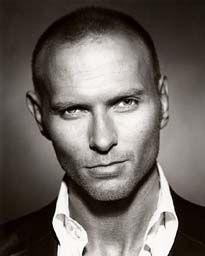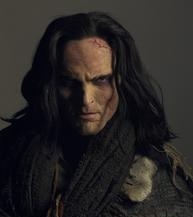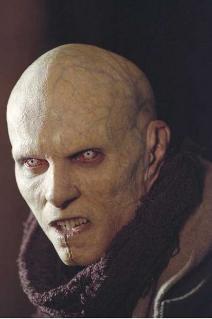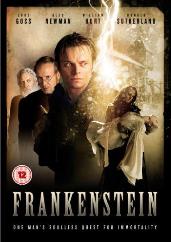|
Find interviews by: | ||
Luke Goss (Part 1) Luke Goss first achieved fame as the drummer in 1980s teeny-pop mega-band Bros but later switched to acting with roles in films such as Blade 2 and Nine Tenths. I met Luke on the set of the Hallmark mini-series Frankenstein when it was shooting in Slovakia in August 2003. He played the creature. Jump straight to Part 2 or Part 3 of this very long interview
"They asked me to do it for some strange reason. I was in China filming with Michele Yeoh, and I got a call. Hallmark do a lot of great projects but you’ve got to choose the one that turns you on. There’s a couple of projects I was asked to do. Then they called about Frankenstein. To be honest with you, I’d heard about it some time before and the only role I wanted to play was the creature. Because it’s the biggest challenge for me as an actor, that I would want to go through that whole process of prosthetics again because I actually hate it. We’ll get onto that I’m sure. “I think they had one or two people in mind for that character, like they do for all these projects. For whatever reason, it found its way through till I got a phone call in China one night, saying: Frankenstein, the creature, it’s yours if you want it. So then I asked the obvious questions like who’s directing. Kevin Connor’s pedigree is quite impressive. It’s not feature credits so much as the work he has done which is still really good work. So then I asked, ‘Okay, I need to see a make-up design.’ Because I’ve never understood with Frankenstein - we’ll get into all this, I’m sure. They said, ‘Do you want to do it?’ and after many, many questions I read the script and it read so much like a film that I said, ‘Sod it, let’s do it.’" Had you read the book? "Yes, I had read the book. You know what, I’d never read the book in journal form. I’d always read the story and it’s always depicted differently. It’s always down to the interpretation of whoever’s writing it. The only true way for anybody to truly understand this story, to understand the metaphoric power that this story has - in 1816 or 2003, it’s irrelevant to me. This story, written by a woman, eighteen years old, 1816, is so relevant, if not more relevant, today. Then it was kind of simplistic: you’re rich or you’re not, you’re aristocratic or you’re not. Now you have people with some money, lots of money, stupid amounts of money - and no money. We have people that are fat, we have people that are thin. We have people that are deemed beautiful, stunning, incredible and downright ugly - a word I never use, I don’t approve of it. “I think all of us, unless we’re afflicted with arrogance or an excessive amount of self-appreciation, feel moments of insecurity. Something about us is not right. We all go through moments of feeling a tiny bit imperfect. Mary Shelley's version is profoundly astute when it comes to people’s understanding of their lack of acceptance. The book is unbelievable motivating and insightful. That book affords you a huge amount of foundation for the character." I understand that you got this without an audition. "My last four roles, thank God, I haven’t auditioned for."
"Strangely enough, there’s a similarity between the premises for me. When I met with Guillermo del Toro he said to me ‘Bring something to the table,’ basically. So I read the script. One thing that wasn’t in there was the ring. I don’t know if you’ve seen Blade 2. You know the ring that they all have? That’s my concept completely. They let me design it and everything. Because I said, there’s nothing that validates this character in the sense of proof of where he’s from. Nothing. It’s like: I’m Bill Gates’ son, honest. Well, show me the proof. So I said if we have something like a ring with a seal, right there we prove it. So when he gives that ring away, for the viewer who understands it, he’s giving away the deeds to his existence at that point. “The whole premise of the character is that he has a very big beef with his father. I actually decided very clearly. I said, ‘I want to show that he’s not indiscriminate.’ I’d rather be in a film less than be in this indiscriminate thing. We had this little scene with a drug dealer. I said, ‘Let’s have people that prey upon people’s weaknesses that I kill. Other than my father.’ We had a big kind of moment where we disagreed, then we agreed. It’s like an alpha male thing. I’m a big believer that less is more, really - unless you’re talking about cash, then we all know that more is more! But other than that, less is more. I think the audience is much brighter than they’re given credit for, especially genre movie fans - probably the most astute fans on Earth. If you don’t have the answers for a genre movie fan, then get ready for a hiding, either verbally or through the internet or whatever. “There’s huge continuity between these characters. He wasn’t accepted, he was a mistake, so it’s like Nomak on speed in the sense of depth. Frankenstein: most people think Frankenstein is the creature. So for the reader, as long as they understand that the creature is the creature and not Frankenstein. I have to be honest with you; for many years I thought Frankenstein was my role. But the creature is a much more in-depth, a much more tragic version of Nomak. He definitely has continuity of character, by coincidence." You must have spent a long time in the make-up chair on Blade 2. Did that not put you off? "No, it’s two different processes. Blade 2 was different, the make-up designer was Steve Johnson, I was very impressed with his work. We used foam for a start, foam latex, which is much more user-friendly from an actor’s point of view just because it’s not as heavy, it breathes a bit. It’s less claustrophobic. I had lenses and teeth in there but it’s still two hours longer to do this make-up, and a hundred times more athletic to go through because it’s silicone, and it’s pieces. Six pieces, and with the body-suit it’s seven. The body-suit weighs at least thirty pounds in weight, doesn’t breathe at all, and yesterday it was 95 degrees - that’s why I couldn’t work today. I’ve got a trailer that can only reduce the outside air temperature by six degree. And I was in make-up, as in ‘being put into it’ for eight hours. “It’s not like, say, The Grinch where it’s a suit and fur - this is silicone. And the only way I can describe it to you: it’s like having thirty layers of cling-wrap around you. But the way they’ve designed the make-up, which is somewhat sadistic, is they’ve designed it so you put the suit on first. So you get into it fairly quickly, then they have to seal the edges, then they start the other stuff. It takes an hour and a half to do that, then another five and a half or six hours of painting and blending and matching the edges. “To put it in very simple terms, if you sit in a chair right now for seven or eight hours, doing nothing - not having make-up, not having people put alcohol on your skin and paint and sticky fluid at five o’clock in the morning - just sit there and do nothing. Don’t speak to anybody, don’t do anything. You would get very claustrophobic in eight hours. Now do it in eight hours when you’re burning up, not talking, having alcohol fumes, airbrushes. It’s kind of strange, with two people - four hands - touching you. After eight hours four hands feel like thirty hands. You feel like you’re absolutely going out of your brain. “But I have to tell you, this role was worth it for me. I hope I’m doing a good job of it. I feel comfortable, I’m very intense with the role. I’m approaching it like a feature. It’s being shot on film as you know, Panavision, and I’ve only done films, this is the first TV. It feels like a film because it’s being shot on film, so in essence it’s the same thing, it’s just being aired on a different medium. So I’m approaching it with the same intensity as I would a film, which is sometimes I think frustrating for the film-makers. Because you do have to get into character, you do have to get very deep, you can’t indulge in the funny jokes and the humour that’s on set when people are inbetween takes because of this character. If you pop out of this guy, then it’s very dangerous."
"It kind of does sometimes, it’s really, really strange. The problem is, with this guy, it takes so long to put it on that it starts to become a genuine psychological thing that you have to get through. If I could be made up in thirty-five minutes then yes, absolutely it would help. The fact that it takes seven, eight hours for the full body-suit, I see so many stages of the make-up, I’m so conscious of the effects. So I try to zone out and I meditate because the Navy Seals who trained me for Blade taught me how to shut my body down. “So I sleep for an hour here, an hour there and I’m not always aware. Of course it helps but wardrobe is a great thing for me and also location’s a great thing for me. But most of my way of doing things is so internal. When you’re in make-up, all you’re aware of is discomfort. With the wardrobe, all you’re aware of is weight. I had five layers, but I was given great freedom to invent wardrobe. So you’re not really aware of it, you don’t have a mirror there, it’s all in here. So it can help, because you visually know what you look like. “But when you’re on set, like we did one scene up on the hill which was nine and a half hours of constant filming. We didn’t come back down for lunch, we just had some stuff sent up. I don’t eat lunch when I’m in character for some reason, it makes me too tired. You go past the way you look, because you don’t see how you look all day. It’s all in here, it’s all in the mind." Have you seen many other Frankenstein films? "I’ve seen De Niro’s film and I’ve seen Karloff’s film of course. I think Karloff was brilliant for his time. Anyone who can invoke a sympathy like that. I think the biggest dilemma I’d love to speak to these guys about - though they’re not here - I’d love to speak to De Niro about what was his biggest judgement call. It is intimidating, this role, it’s a very scary role to play because there’s so much room to get it wrong. My biggest judgement call was the language, the speaking. First, I need to say De Niro’s my idol, my all-time idol. Him, Hopkins, Steve McQueen - these are people that are truly modern legends. Not the Clark Gables and the Burt Lancasters and the Marlon Brandos. Great actors of all time. “So De Niro is an idol, and it’s not that I didn’t like it, but I didn’t go for that approach of being somewhat mentally challenged. It didn’t make sense to me. This is obviously hypothetical but you have to embrace it as reality, otherwise it becomes so farcical that: how can you play it? You know this, you do genre movies, so you understand people’s snobbery towards genre films: fuck them. Truly. That’s not particularly eloquent but it’s simple. I can’t stand snobbery towards genre films because in a way there’s so much room to get it wrong. And a lot of people do get it wrong. Look at The Hulk. Tim Burton - fantastic." Until he did Planet of the Apes. "Exactly - too many sets! And the DP - I don’t know who lit that movie for him. You look at his lighting and it’s so gothic, so incredibly dark and mysterious, you can’t access his worlds. But you could access this thing. And he didn’t have a rein on the performances - they were so huge. But there is so much room to get such fantasy wrong because the only way to get it right is to bring the reality to it. When I did Nomak I got nominated for that, for a Saturn Award, hopefully because I really tried to create a reality. I got criticised by journalists in London, saying that I’d taken the role too seriously; if I relaxed a bit more maybe I’d enjoy my work more. What they didn’t realise is that I would stop enjoying it if I wasn’t so tortured by it. “He was one of those journalists who wrote for the broadsheets and was more at home discussing Chekov or Shakespeare where there’s actually more contrived performances than you’ve ever seen. There’s that tempo with Shakespeare which is wonderful but... Speech: I decided to go with the idea that he’s never spoken because he’s never needed to, he’s been in the forest. It’s something he can do, he has the mind, I decided, of a scholar - only because I think Dr Frankenstein would have chosen an ideal brain, a perfect brain. A scholar of philosophy or medicine or something. Maybe I understand my own mechanics more than anybody. I don’t care: I like to play with those ideas, that’s up to me to enjoy, not for anyone to see necessarily but for me to think about. Maybe I’m aware of my own medical condition, maybe I’m aware of my limitations so horribly that it makes my existence even more painful. But in essence I have a brain that is obviously connected. “I didn’t go for this lumbering thing, I decided to go for a limp, because I thought: if he can sew an artery together then I’m sure he can do the rest quite easily, he can do nerve endings at least. I went for a limp at the beginning of the film because I decided simply that one of my tendons, just like a hamstring, would be too short. It gave me a limp and it gave me a fragility that allowed me to be more in awe of things. I’m not a monster, I’m a man that has been created. I don’t speak because there’s no need to. When I see Eva speaking, I speak. Sound created these huge problems for me, because how do I begin to make a ‘guh’ sound? If I go like this and you react, it’s instinctive. But because I’ve heard it, it’s almost like: how do I do it? I touch my throat because I hear a vibration in my throat that I haven’t heard before. It’s more something that I can actually do but I haven’t accessed. Although it’s not fluid yet, I don’t think it takes too long to do it - otherwise there’s no logical reason why he can become as eloquent and articulate as he becomes in such a short period of time. It’s just impossible."
"Exactly. He’s reading Paradise Lost. I’m thinking: no, it’s impossible. So I decided to say fuck it, I’m going to do something different. I’m going to have him speaking quicker and when he says his first word it’s going to surprise him that it comes out. He’s smiling but in some ways the fact that he can do this makes his life more painful because he knows that he’s actually more capable of interacting than even he thought. It’s like having a bit in his mouth and then not having a bit in his mouth; his restraint’s off. He’s very conscious of his horrificness, it’s tragic. So that was the biggest judgement call for me of the entire character: how he could be so compos mentis so quickly. “Yesterday when I did the dream sequence I played him, not stupid but scary - because that’s all Victor thinks he has created. In a way, he’s underestimated his own abilities. And I had this wonderful opportunity to create that. I didn’t ask anyone’s opinion, I just said, ‘I’m going to play him somewhat scary.’ Because that’s all Victor thinks he was capable of creating. When he says to me on the mountaintop, ‘You can speak,’ and I say, ‘Yes, and reason.’ He says, ‘How is that possible?’ I say that I’m endowed with perceptions, and one time I added the word ‘sir’. He said, ‘You’re a monster’ and I said, ‘Which you created.’ But I said, ‘Which you created, sir.’ I call him sir because that gives me a moment of more nobility than even he has. So I played with it. It gives more weight to those moments of wordiness that we have. “He’s very eloquent and he’s very dignified and I had to find a way of going for him. That whole unintelligible thing, I just didn’t want to do it, I didn’t understand it, I didn’t ever get it. Same with the big, huge scars. The scar is there, but we see him twice and people know what’s underneath the costume. But I’ve never been a big fan of the idea that a man can sew an artery together, but then he gets someone with mittens on and very dark sunglasses to sew the limbs together. I’ve never understood that, and I still don’t. Yes, I have a big scar here and here but I’m not going to play it up. We know who he is. We can imagine that he’s made up of a number of pieces but I have never liked that idea of making him so stupidly constructed. We’re not sewing a sail together, we’re sewing limbs together, from a man who has such a fine hand that he can sew an artery together and nerve endings on an eyeball. So I cover myself up, not through vanity but I don’t look nice. You’ve seen me. This is my face." Continue to Part 2 of this very long interview, where Luke discusses ZigZag, Charlie and Plan Nine from Outer Space: The Musical. Or jump to Part 3 where he talks about Silver Hawk and the role he didn't get in Daredevil. | ||

 How did you get this role?
How did you get this role? One reason must be because of
One reason must be because of  Some actors become a character when they put on a mask. Do you find that as the make-up is put on, you’re becoming the character?
Some actors become a character when they put on a mask. Do you find that as the make-up is put on, you’re becoming the character? He goes from nothing to quoting Milton.
He goes from nothing to quoting Milton.